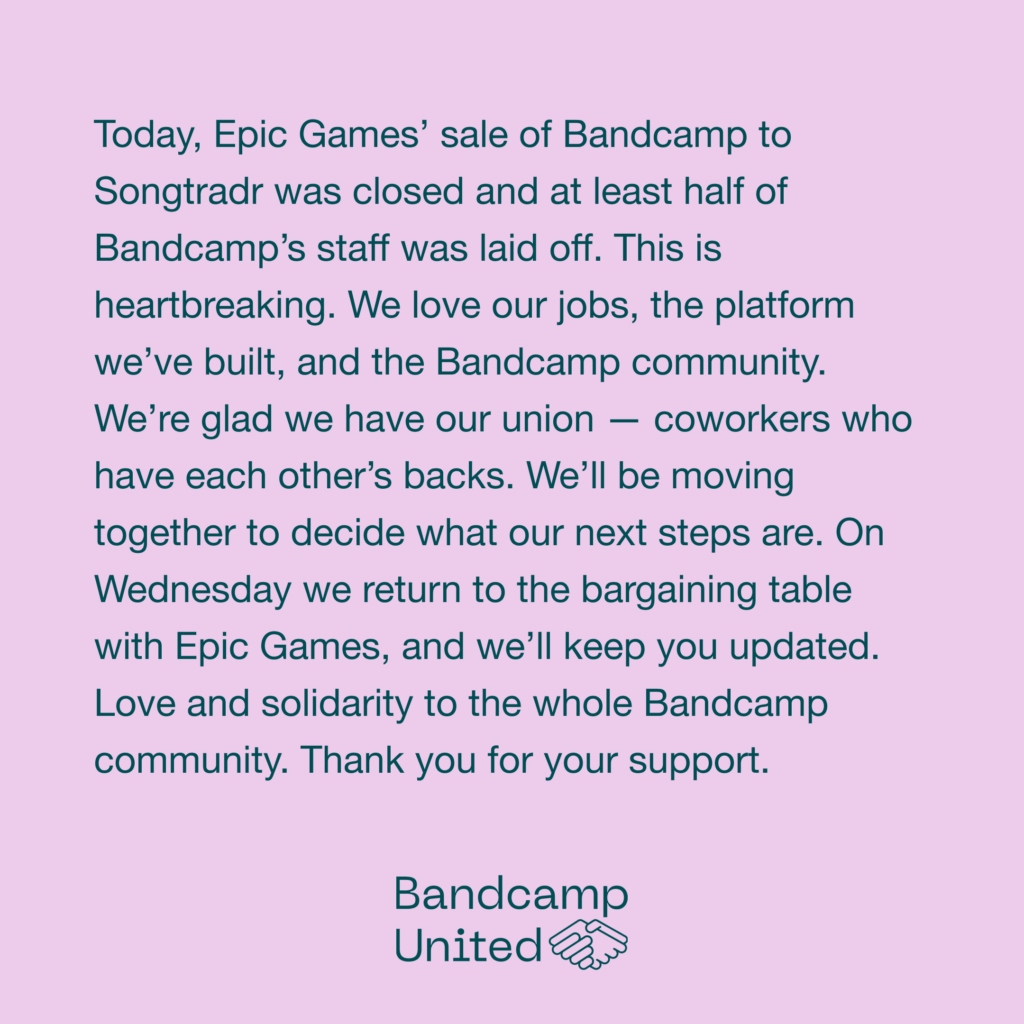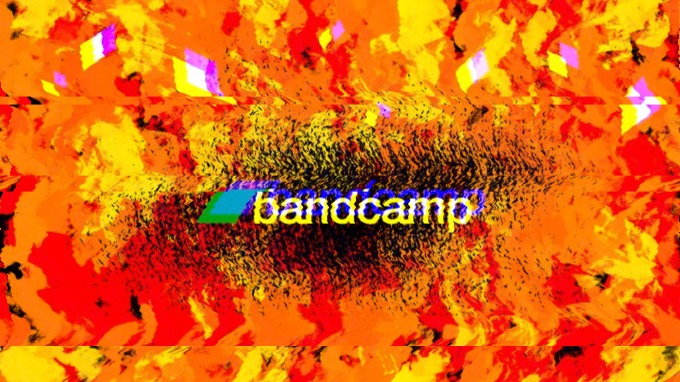There’s a lot of fear and anger out there following the news of Songtradr’s acquisition of Bandcamp, and what it might mean for independent music.
As someone who runs a business that very much relies upon Bandcamp, I can admit that it is causing serious concern – not just for my labels, but for the many independent artists we’ve worked with over the years.
A quick scroll on your social media platform of choice quickly paints a picture of panic.
My entire livelihood is crumbling before my eyes 😎
— Dan Mason ダン·メイソン (@DanMasonVapor) October 17, 2023
Bandcamp isn’t just a marketplace, like Amazon or eBay, it’s an eco-system. For underground, niche genres like Vaporwave and Synthwave it’s a vital hub. Fans build their collections and rely on the app, not just for everyday listening, but to connect directly with their favourite artists in a way that Spotify simply doesn’t offer.
It provides independent artists and labels with a chance to build an audience and customer base, and – crucially – it exists as one of the last refuges in the streaming era where you can make a modest living, whilst being creative, and where people can place a value on your art that’s worth more than a fraction of a penny. [F*** you, Spotify]
The uncertainty has led many people to fear for the future, not just for themselves, but for the communities that underpin these genres.
There’s also the personal human tragedy of the jobs that have been axed, and the fact that Epic/Songtradr appear to have completely disregarded Bandcamp’s union members in the process.

As today’s Pitchfork editorial suggests, “Songtradr’s opening moves don’t seem like the tactics of a company that understands what it has purchased”. And that’s a worry in and of itself.
All of the uncertainty creates a vacuum that gets filled with speculation – and a lot of posts marking the death of Bandcamp as we know it.
Bandcamp
2007-2023
💐
— Tupperwave (@TUPPERWAVEMUSIC) October 17, 2023
For Dutch producer, 猫 シ Corp., the lack of information is making things worse.
“We don’t know the whole story with what’s happening, so it’s impossible to give a balanced view. On the surface it looks like Bandcamp should be hugely profitable, but the way they’re acting it doesn’t seem that healthy.
“We have a saying in Dutch: “waar gehakt wordt vallen spaanders.”
“Basically it means, if you’re gonna chop wood you’re going to get splinters. And that’s not fun for anyone. And it’s not fair, but sadly, that’s what we are seeing with these job cuts.
“That’s not to justify what they are doing at all, but big business is brutal and their primary driver is going to be financial.”
The truth is that we don’t know what the future will hold.
The same pessimistic forecasts were made when Epic took over and, sure, maybe that was the first in a chain of events that led us to where we are today… but we don’t even really know what Songtradr want it for.
What it does though, is bring into sharp focus just how important a platform like Bandcamp is for niche genres like Vaporwave and Synthwave – both from an artistic perspective and from the point of view of a fan.
Take Synthwave producer, Makeup & Vanity Set, who argued on Twitter/X that the acquisition is part of a recent trend that has seen the devaluation of music to such an extent that “releasing music in the modern era is a disaster”.
He lays the blame “at the feet of the music business for caving [in] to a bunch of tech companies and handing the entire livelihood over to streaming companies.”
It’s certainly true that streaming revenues are derisory, with Bandcamp one of the remaining platforms where an independent artist can earn a reasonable amount for their creative output.
Bandcamp Fridays, where the site forgoes its share of revenue for 24 hours once a month, are worthy of a separate discussion altogether; on the one hand an artist’s notional revenue increases by 10%, but I’d love to see what a statistician made of the increased saturation we now endure on those days.
All that aside, there are good reasons why Bandcamp is much loved by artists.
For starters, it’s a hugely efficient marketing tool. The infrastructure’s a bit creaky, but the ‘passing trade’ that comes through purchases by genre tag is worth the entrance fee alone… (in my opinion).
In a newsletter published earlier this week, Vampire Step-Dad talked about the challenges artists already face getting heard above the ‘noise’.
“Music is meant to be an experience over time, and much of the internet is focused on super short attention grabbing images and videos”, he wrote.
It’s true that Social media platforms prioritise raw ‘content’ over creativity, making it harder than ever to get music in front of an audience – without stripping it down and serving it up in an algorithmically friendly way.
In that sense Bandcamp is – or at least was – an outlier.
“A lot of musicians are very nervous that the best means they have to sell their music to people that care will go away, and they’ll be stuck selling their music through megacorps like Apple, Google and Amazon.
“It goes without saying that those guys have little to no interest in independent musicians other than to boost the number of songs in their libraries.”
Vampire Step-Dad’s article highlights some interesting challenges ahead for artists heavily tied to Bandcamp as a means through to connect with an audience. But for fans, too, there are concerns about the future and how it will affect the way they interact with and discover new talent.
Rob Dyson, a former Forever Synth host and fellow editor of FutureSounds, argues that the new owners have a cultural responsibility to safeguard the platform:
“It’s depressing because Bandcamp has always meant a direct line into – and an immediate and meaningful way of supporting – the artists I want to grow.
“As one of the few revenue-generating streaming options, not to mention because of the hundreds of albums I have personally accumulated in my Bandcamp collection, if Bandcamp were to collapse I would feel the new owners have failed me; as a music lover, customer, and promoter of smaller artists.”
There will, no doubt, be some purists who feel that the Vaporwave scene was never the same once ‘monetisation’ started creeping in with the Bandcamp era, unleashing the increasing prevalence of physical merch sales.
But the problem with the old days of free sharing via mediafire and other similar sites, is that it relied on a healthy network of community groups and networks on social media platforms like Facebook.
And guess what? A handful of other billionaire idiots have pretty much ruined them too…
Where are all the benevolent billionaires when you need them?
And more importantly, where do we go from here?
Are we right to existentially fear for the very future of Bandcamp – or should our energy just be focused on the human consequence of the jobs that have been lost since the acquisition took place?
I’m f***ed if I know, which I know isn’t particularly insightful or helpful, but Pitchfork’s editorial today appears to suggest that the solution is to build alternatives; “a host of competitors, a vibrant ecosystem to diversify the market and encourage innovations that will improve the current situation for artists, labels, and fans alike.”
It sounds good in theory, but not everyone agrees.
Occams Laser, a UK-based Darksynth artist, thinks that cool heads are called for and I can understand where he’s coming from.
No-one would benefit from the streaming equivalent of a ‘run on the pound’.
If Bandcamp’s users were to pull out in significant numbers, we might inadvertently hasten its demise.
Occams Laser:
“Right now everyone who uses Bandcamp is feeling uneasy. Other media outlets (like Pitchfork) are catalysing that fear and amplifying it; suggesting things that will actually make the situation worse, such as jumping ship and actively not using Bandcamp…
“For a number of reasons, this is stupid. If, as an artist or fan, you love Bandcamp then treat it as business as usual. Songtradr bought Bandcamp because it is a profitable business. The cuts they have made are clearly not to everyone’s liking but they have not cut the core thing… the artists and fans.
“There have been cuts to the editorial staff, it’s true, but as far as I can gather it was cut from 5 members to 3… and those editorial staff were supposed to cover the MILLIONS of artists on Bandcamp.
“It’s worth remembering that WE are what continues to make Bandcamp work, as both a community and platform for music.”
It’s certainly true that some Vaporwave labels, like Hiraeth and Aloe City Wrld, have already migrated away from selling physical copies of their albums on Bandcamp, some of which point to the 10% cut they take on physical items sold on the platform.
In addition to that, Epic’s takeover of the site last year led many people to fear that Bandcamp might start to take a more aggressive approach to unlicensed sampling, which clearly affects Vaporwave as a whole more than other independent scenes.
Whilst not directly linked to the changing ownership of Bandcamp, that’s one of the reasons that many artists in the scene started to work on sample-free music.
For 猫 シ Corp., who runs Hiraeth, there are a number of factors that led him to establish his own website to host merch sales, but he’s very unlikely to leave Bandcamp fully because it’s probably still “the best marketing tool money can buy”.
I asked him if he had a message for the site’s new owners.
“Just don’t f*** it up. Please keep it what it’s always been, a site for music and for artists and fans.
“I really do believe that the team that started Bandcamp did so with the best intentions, and they had a mission that’s being destroyed by these big businesses that have come along in recent years.
“Ultimately, though, if the situation is unsustainable in its current form then I really hope they can fix it because Bandcamp is vital in so many ways.”
I’m eternally optimistic by nature, and so I’m reluctant to make fatalistic predictions about the future of Bandcamp, even if I understand why people feel so uneasy about recent developments.
Like many others, I dreaded Elon Musk’s Twitter takeover, and the results have been pretty catastrophic; including polluted feeds, and piss-poor engagement if you don’t pay for the blue tick. But the alternatives which have sprung up in the short term don’t necessarily hold the answers either, with one of the servers on Mastodon that was set up to host the Synthwave community recently announcing that it will have to close later this year because of the costs involved.
That’s why I won’t be jumping ship just yet.
That said, it’s been suggested elsewhere that artists and labels should urgently download their email lists and sales reports, which is a smart move regardless. Plus, there are dedicated browser extensions that can make batch downloading your collections easier, so there’s no harm in doing that either if you’ve got the storage space.
The bottom line is that as a scene we have to plan for the possibility that things are going to change, but in some respects I think we’ve known that for a long time.
Oh yeah, and all hope for the best…
Written by Enzo Van Baelen
